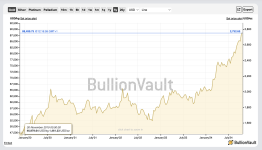Tim Beaton
New member
- Messages
- 7
- Reaction score
- 1
- Points
- 3
Hi. I’ve been considering a gold IRA for my retirement, and it seems pretty attractive, especially with inflation being what it is. Plus, gold and silver prices surge to new records. Anyone have thoughts on the pros and cons of investing in gold via gold IRAs?

